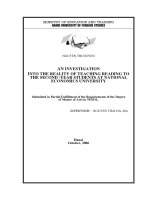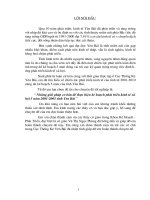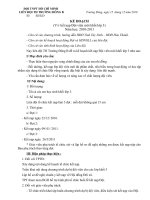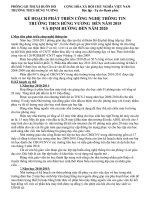Bài tập kế hoạch phát triển marketing
Bạn đang xem bản rút gọn của tài liệu. Xem và tải ngay bản đầy đủ của tài liệu tại đây (139.47 KB, 14 trang )
Bài tập: Kế hoạch phát triển Marketing -
Topic: SERVICES MARKETING - CRM
1. Answer the following:
(a) The marketing planning process.
(b) Monitory marketing planning and services.
2. Answer the following:
(a) Service market segmentation.
(b) Customer loyalty.
3. Answer the following:
(a) Explain the role of marketing communication.
(b) Service promotion.
4. Explain the role of intermediaries in planning and managing service delivery.
5. Write a detailed note on CRM programmers.
CONTENT
I. INTRODUCTION:
Today, businesses have tried to understand customers, competitors and known
their strengths and weaknesses as well as opportunities and challenges for planning
a creative marketing strategies to meet customers' needs in the best way.
After studying marketing management, I have chosen the topic "MARKETING
SERVICES - CRM" to study issues including:
1. The marketing planning process, monitory marketing planning and services;
2. Service market segmentation, Customer loyalty;
3. Explain the role of marketing communication, Service promotion;
4. Explain the role of intermediaries in planning and managing service delivery;
5. Write a detailed note on CRM programmers
II. BODY :
1. The marketing planning process, monitory marketing planning and services :
(a) The marketing planning process:
Marketing plan is a detailed table of contents and scopes of marketing activities.
The ocntents of marketing plan consist of tasks, goals, situation analysis, development
of opportunities, targeted markets, marketing programs, financial situation, and
schedule.
A marketing plan includes the following sections:
_ Executive Summary: Presents an overview of concise objectives of the
management plan to catch the main issues.
_ Opportunity and Issue Analysis:
+ Opportunities / Threats Analysis: Managers must identify the opportunities and
challenges of the product.
+ Strengths / Weakneless Analysis: Managers must identify the strengths and
weaknesses of the business and products.
+ Issues Analysis: Enterprise uses analysis and evaluation in order to identify
issues to be addressed in the plan.
_ Objectives: Managers must determine financial goals and marketing plan.
+ Financial Objectives: such as the rate of return on investment and profit.
+ Marketing Objectives: such as revenue, market share, distribution channels,.
_ Marketing Strategy: Presents marketing direction to achieve the above
objectives. The contents of the Marketing strategy include:
+ Tagte Market, Positioning, Product Line , Price , Distribution outlets ,
Salesforce, Service , Advertising , Sales Promotion , Research and Development.
_ Action Programs: The above content is specifically analyzed to answer the
following questions:
+ Which work will be done?
+ When to do?
+ Who will do?
+ How much will it cost?
_ Projected Profit-and-Loss Statement: Estimated budget for marketing activities
and other expenses. Sales and profit and loss. This budget is the base for the
development of production, recruitment and Marketing implementation.
_ Controls: Monitoring the implementation process of Marketing.
(b) Monitory of marketing planning and services :
Monitory of Marketing planning and services is to ensure the marketing programs
towards the planned objectives.
Managers must monitor the implementation of the plan such as sales analysis, market
share analysis, marketing expense analysis, financial analysis and exploration of
customer satisfaction.
+ Sales analysis: involves the analysis of actual sale in comparison with price
targets.
+ Market share analysis: To know the position of the business compared to
competitors.
+ Marketing Cost Analysis: Evaluate costs versus sales to ensure that the
business does not pay too much in order to achieve targets.
+ Financial Analysis: To identify factors that affect the financial results of the
business.
+ Exploration of customer satisfaction: regular monitoring and the preferred
level of customer satisfaction to the managers can respond more quickly.
+ Adjustment of operations: used to deflect marketing activities compared to
planned targets.
- Managers need to assess the profitability of the product, market sectors, size of
orders. Such information is used to determine which products and marketing
activities that need to expand .
Through the above analysis of profitability, when revenues decrease, managers
must find ways to more efficiently conduct . Therefore , they need to analyze
advertising effectiveness , promotion , distribution , sales force to make timely
adjustments .
Marketing is an area in which the objectives, policies , strategies and programs
likely not match the market quickly chong.Do that every business needs to review
the strategic direction of the school. Check to ensure that the strategic objectives,
strategies and systems Marketing activities adapt to the environment.
2. Service market segmentation, Customer loyalty:
(a) Service market segmentation:
Enterprises today have realized that they can not attract buyers on the entire market.
Buyers are too large in number in the market, stratified by geography, product demand
is diverse.
Thus, instead of catering to the entire needs of the market each business will
determine for themselves which part of the market now has the ability to serve the
best, most beneficial. Therefore, businesses will leave the common market market-
oriented selection. Such targets market segments to the segment xa1x any business
will compete and market segments will not competition .
Market segmentation is the process of dividing consumers into groups based on
The differences in needs, personality, behavior.
- Market segmentation must meet the following requirements:
- + Measurability : size and purchasing power (purchasing power) of the
distribution being must be measurable .
- + Accessibility : the market segment to reach and serve these communication
activities and distribution system .
- + Feasibility : The enterprise must have sufficient financial , human resources
and technology to meet the needs of the market segment .
- + Attractiveness : The market segment to profitability and scale large enough .
There are many criteria for market segmentation , the segment can use a criteria or
combination of criteria together . Criteria commonly used to segment the market as
geography , population psychology and behavior .
By geographic area:
This method of dividing the market into various geographic regions as countries,
regions, provinces, cities, ... now will determine one or more business areas vuc.
Each area will have cultural differences chemistry, climate, economy ... thus
different needs.
By population:
+ Segmentation by age: the age difference will have different physiological. Thus
demand will also vary.
+ Genders are used in many market segments. The gender difference in making
operating needs of different products such as perfume, cars, clothing, watches,
glasses, ...
+ Family size also affects cassava such as buying a home buying, washing
machine, fridge, ...
Psychology:
- In this segment, the customers are divided into groups based on social classes,
lifestyles or personality.
- Social classes: In society there are many classes and each class will have
different shopping preferences.
- Lifestyles: The interest of consumers for goods is influenced by lifestyle,
expressed through a purchase option.
- Personality is a very noted criterium in market segmentation for products such
as cars, wine, beer,., ..
- Behaviors: behavioral segmentation includes the following categories: (1)
segmentation on purchase occasions; (2) segmentation on benefits; (3)
segmentation on loyalty; (4) segmentation on usage level.
- Customer makes purchases on which occasion of the month , quarter or year to
meet seasonal demand .
- Benefits of shopping : When buying, customers often consider the interests of
the item will bring them economic, or health benefits.
- The level of customer loyalty, the greater the level is, the greater the number of
customers a business will increase. This is a classification method following
behaviors that marketers are very interested in. Strategies to maintain existing
customers are completely different from finding new customers .
- Businesses can segment customers according to the level of use of the product.
For example, in the field of beauty products and personal care , there are some
customers use a lot, while some others have very limited use . Thus , the
segment on the extent of use can help businesses make the marketing policy
more consistent.
Market segmentation is usually carried out through the following steps: identify
the business market, determine criteria for market segmentation, market
segmentation carried out by the selected criteria.
Market segmentation is the basis to build market strategy of the business. If the
business performs well in niche market segments will lead to success for the
strategy based on ability and advantages of business consistent with the needs of
the market. Conversely, if the market now choose too large compared to the ability
of the business will not succeed.
(b) Customer loyalty :
With the same type of goods , there are now different types of customers . There
are people who are willing to buy large quantities of goods , there are those who have
not purchased but probably will buy in the future ... With the same goods , customers
have a lot of different choices among providers . Therefore, the chance to win for
every business customer is very small . In that competition , many businesses having
large quantities of sold goods are not the winner . But the victory belongs to the
enterprise that has more loyal customers.
Customer loyalty is understood that customers purchase / use of enterprise
services and will continue to select businesses in the next time . In fact the impression
and feel of the customer in purchase / first use of the service is now very important .
Most of the customers are satisfied with the purchase / use of business services
currently or previously will continue to purchase / use of business services in the
future when they have needs . So , is less expensive than to convince them to purchase
goods / services used by businesses than the cost incurred to attract new customers .
Today, the business has been gradually realized that creating sustained long -term
customers will bring greater benefits to increase sales in the short term .
3. Explain the role of marketing communication, Service promotion:
(a) Explain the role of marketing communication :
In addition to providing a market for good products with reasonable price and
children are the target customers, the business also to communicate to their target
customers. Information is given to the right target customers through several stages
with different communication tools under various forms of media.
Marketing communication includes 4 tools:
+ Advertising :
Advertising is the method using media tools to convey information about the
quality and benefits of products to customers.
Because there are many forms of advertising and how to use it is difficult to
generalize the characteristics of personality it is a form factor of marketing
communication system.
In nature, advertising have the following characteristics:
+ Public presentation: Advertising means conveying public information about the
product officially and legally. Due to multiple recipients, sellers and buyers get to
know and accept advertised products.
+ Pervasiveness: Advertising is a communication tool which is very extensive,
allowing sellers to repeat a message many times, helping buyers and comparing
received messages of competitors to choose from. High scale advetisiments show
great ability and success of the business.
+ Amplified Expressiveness : Advertising creates the opportunity to showcase
businesses and products through the use of images , sounds , colors , ... However,
abusing such factors may make the message ambiguous or misled.
+ Impersionality : advertising does not push the sales like sales force does . The public
does not feel compelled to pay attention or response . Ads are only form of monologue
, not a dialogue with customers .
In other words, advertising is used to build lasting image for the product (Coca - cola
advertisement) or stimulated rapid consumption (supermarket ads for weekend sales).
Advertising is an effective tool to communicate to clients with lower average costs .
Customers believe that strong brands have advertised good value .
+ Sales promotion : short -term incentives to encourage the purchase of a product
or service.
Although there are many promotional tools but they have three characteristics :
- Communcation : Promotions get attention and provide information to guide
consumer product .
- Stimulation : Promotion uses tools to promote , encourage and increase benefits
to persuade customers to buy immediately . Ads give reasons to buy also created
the promotional stimulus to buy .
- Invitation : Promotion is an invitation urging customers to buy the product
immediately .
Business use promotion as a tool to create faster response and greater purchase .
Sales promotion can be used for product attention and enhance sales which are
declining . Sales promotion is effective in the short term , however it is not
effective while building long-term brand favorability .
Currently, the tools is very diverse for promotion . Depending on the object ,
promotional objectives , firms choose different tools . Some of the tools commonly
used are discounts , bonuses , gifts , ...
+ Public relations :
+ Public relations: is defined as the management function to assess public attitudes,
policies associated with the organization of the social benefits, the program works to
achieve understanding and acceptance received by the public. PR stands for public
relations
PR is often targeted to establish and maintain a positive impression of our group of
companies. Commonly used form of press conferences, organizing events, providing
information to media coverage about the product or company, involved in community
activities such as subsidies, social fund contributions and donations for special
events ... to enhance the company's image.
+ Personal selling: is the face to face communication of salesperson with potential
clients to present, introduce and sell products.
Direct selling is a tool that the most cost effective in the late stages of the
procurement process, especially in creating the fancy of buyers, beliefs and actions
lead to purchase .
(b) Service promotion :
Service promotion is product and business communications activity to customers in
order to convince customers to buy products .
In a simple way, Promotion can be understood as the efforts of businesses to
communicate , persuade , remind and encourage customers to buy products, convince
them of the superiority of products as compared with similar products , as well as to
understand the business. Thanks to Promotion, the business can sell products in a
larger quantities and in a faster way.
Promotion’s activitities are shown by label , packaging , display booth , personal
selling , customer service , fair competition , and messages through the media ( such
as newspapers television , radio , mail , posters , ... these activities by enterprises or
organizations implementing information .
Through promotion strategy, enterprise provides information to potential customers to
know the real advantages of products. Furthermore, promotion strategy also creates
awareness and customer favorite new product.
Service promotion includes the following tools:
Advertising: to attract customers' attention, convince them of the benefits, the
attractiveness of the product to change or reinforce attitudes and behavior of customer
confidence in the products business. advertising media such as radio, television,
newspapers, ...
Public Relations : is the indirect communication activities of the enterprise to create
public sympathy as well as product. Public relations is done under the forms of
sponsors , charity event , ...
Propagation : is regarded as a special form of " public relations " , in order to increase
the credibility , increase public sympathy as well as the interest in the development of
local financial support for the movement arts , sports , ..
Sales Promotion: the short -term measures , and support for ad and sales to encourage
and stimulate customers to ultimately buy products .
Direct Sales : the contact between salespeople and customers to advise , persuade ,
introduce customers to purchase products .
In promotion also applies AIDA model:
- To get Attention
- To hold Interest
- To arouse Desire
- To obtain Action
Promotion is an important element of Marketing Mix. An effective promotion mix
will be an important contribution to the success of the marketing strategy.
4. Explain the role of intermediaries in planning and managing service delivery :
Distribution of marketing is a transition of products from the manufacturer to the end
consumers, expressed in many ways and different activities.
Distribution marketing has changed the ownership of products from the manufacturer
to the consumer through middlemen. Those who connect manufacturers and end
consumers are called intermediate distribution . There may be several types of
intermediary distribution:
- Wholesalers: are the intermediate distributors buying products from
manufacturers and selling to other intermediary distribution.
- Retailers: are the distributors buying products from manufacturers or
wholesalers and selling directly to consumers.
- Agents and brokers are the intermediaries for distribution on behalf of
manufacturers. Agents and brokers do not have the ownership of products.
Wholesalers and retailers spend money on buying goods and resell them for profits.
They are called trade intermediaries. Brokers, manufacturers representatives, sales
agents are seeking clients on behalf of manufacturers to negotiate purchase
conditions. This is the intermediate agent. They only earn commission sales.
The role of distribution is taking products to the market. The distribution decisions
have great impact on marketing efforts. Due to distribution intermediaries performing
a number of various functions to distribute, the business marketing plan will be
different when choosing intermediate distribution.
The choice of intermediary distribution is one of the most important decisions of your
business. It takes time to mediate the relationship between distribution and new
business development trien.Doanh will now have difficulty in penetrating the market
as distributor members have strong ties. When you have built up alliances in the
distribution of new products launched easily truong.Nhung potential distributors will
increase marketing for your business. Thus, a reasonable distribution strategy,
favorable the buyer will make the products penetrate the market quickly.
Costs and profits also affected by the decision distributor selection. A business
performs all distribution functions have to bear all the costs and revenues of all
business nhuan.Mot part of using intermediaries for distributing the cost will drop but
profits will fall due to sharing the intermediate distribution. On the other hand, profits
of the business will increase if sales of intermediate distribution due to higher sales of
available self distribution.
Consumption of products is often influenced by the amount, location, market
penetration, image, service and marketing plans of the wholesalers, retail traders.
When using too many middlemen, business will only get links with fewer consumers
and the level of control and lower marketing.
Besides, thanks to the relationship exposure , experience , specialization , ... the
intermediary distribution businesses bring many benefits . Specifically :
- Reduced costs for manufacturers : If the auto manufacturers organized
distribution network will be large costs because no specialization , lack of
experience, the small scale .
- Increase your reach to customers while reducing business contacts and business
customers .
- Share with enterprise risk : In case definitive purchase products distributor will
now withdraw immediately reinvested capital and avoid price volatility .
- Helping to meet the demand and supply : Many sellers do not know where the
buyers and vice versa . Then giu1p distributors for supply and demand meet.
- Increase the competitiveness of enterprises : By using the intermediate
distribution will save costs , increase customer reach , reduce risks for businesses
will be increasing their competitiveness .
5 . Write a detailed note on CRM programmers:
CRM stands for "Customer Relationship Management". It is a strategy used to exploit
and understand more about the needs and behaviors of customers in order to develop
relationships with customers. The good relationship with customers is an essential
factor for success in business. CRM is a process to help provide information about the
customer, the sales, marketing, support customer service in an efficient manner, high
availability and market-oriented.
The purpose of CRM is to bring technology and human resources to work experience
business insight to the behavior of customers and the value that customers bring to the
business. When CRM works effectively as desired, the business will achieve:
- Provide better customer service
- Create service centers (call centers) more effective
- Improving the efficiency of cross-business product lines
- Assist the sales staff and service ends faster sales
- Simplify the sales process and the marketing
- Discovery of new customers
- Increase revenue from customers
Automation of basic business processes (marketing, operations / rules, sales,
operations / process service / customer support)
With new markets, find out how true that business customers towards the business’
targets? markets provide the right products and the right time point? CRM provides
tools to support the development, objectives, implementation, management and
analysis of marketing strategies.
Thanks to the tools to accurately assess marketing activities, there can efficiently
manage marketing campaigns. Subscribe to this section, will fast realizes just make
the right decisions on major resources, can significantly increase marketing ROI.
Marketing Automation helps managers to set up marketing strategies, evaluating
strategies; tools and support in the implementation of marketing conduct.
The following tools support the marketing of businesses:
• Strategic Marketing Management: To identify, administer and implement
Marketing plans effectively throughout the business process. To allow analyzing the
details of each client directly in each marketing campaign. Can also assign, schedule
and track marketing activities quickly.
• E-mail Management: Send an e-mail with large volumes Also all contacts,
communicate with clients and stored to facilitate the creation of reference when
customers contact the relevant issues to a specific marketing campaign.
· Quản lý danh sách: Đây là công cụ cần thiết cho các nhân viên Marketing,
giúp họ dễ dàng tạo ra danh sách khách hàng mục tiêu dựa trên những đặc tính
cụ thể.
• Customer call management: These calls come into contact with customers
integrated into every marketing campaign. Make a list of target customers and then
make a detailed plan.
• Tool for assessing marketing effectiveness: Marketing Campaign Follow-up,
evaluation investment cost efficiency - CRM can analyze marketing campaigns by
evaluating other important details using the tools or features in CRM reports.
CRM supports you to manage transaction information to customers under process
sales opportunity management, sales cycle analysis, forecasting, and provides
sales analysis reports.
The important features of CRM support for sales activities and the benefits that it
brings. This powerful tool is designed to help manage, forecast and make the report
stage of the business process more efficient, since it can control the resources and the
entire sales process.
The functions in Sales Force Automation: Forecast sales, sales management resources
and sales activities, sales process management, time management, sales performance,
analysis and reporting.
The function of the Customer Care Automation include: customer care activities,
contact management with clients, with Built-in functions "work flow" function "level
of customer support", Support for Call Center Solutions Library (KB) Provides the
ability to analyze customer behavior through technologies such as business
intelligence (BI)
For analytical CRM, data gathered from operational CRM are analyzed according to
customer segments or to determine the potential for promoting customer relationship.
The results of the analysis of customers can often create conditions to develop
targeted advertising campaigns to increase customer value.
- Proven relationships with customers ( phone , email , fax , web , sms , post , in
person). Collaborative CRM helps businesses interact with customers through all
channels (direct contact , mail, fax , phone , web , e - mail) and supports collaboration
between the group 's Members channel with customers .
- Collaborative CRM is a solution built between people , process and data together so
that businesses can serve and keep our customers better. Information and data
operations can be structured , unstructured , conversational form and / or in the
transaction as chatcua them ..
In today's business environment , monitoring , processing and customer retention
encounter many difficulties . Use CRM system will help businesses to monitor, test
strategy and business development .
II. CONCLUSION :
In summary, CRM (Customer Relation Ship Management) is a powerful method
practical and effective for maintaining and creating relationships with customers. It
is associated with the operation of the business but also closely linked with the
client. This binding leads way for businesses to step up a new level of success.
Besides, the enterprise must also build a good marketing plan in order to serve and
maintain customer loyalty. Want to increase market share for their products, they
have to make business communication, creative and consistent with target
customer segments as well as accurate.
REFERENCES :
-rnmarketingnet
-
-
-Marketing management – Le The Gioi, Education Publishing House – 2007
- Basic Marketing - Dinh Tien Minh , Labour Publishing House – 2012.









